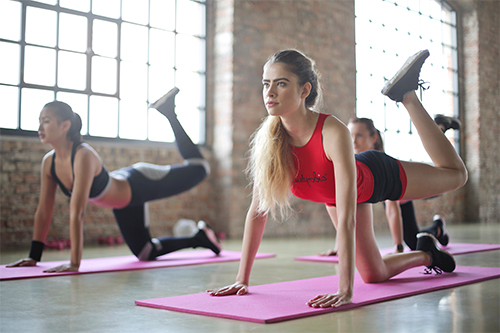When you log a good workout, your brain rewards you with endorphins, aka those “feel-good hormones” that can improve your focus and mood while lessening pain. But, even though you’ve got a physiological guarantee that you’ll feel euphoric after a sweat session, it can often be tough to find the motivation to actually get to the gym or stream that workout video. You probably already know you should have a gym bag packed and ready to go, and that it’s best to schedule your workouts like appointments. But, if you need some extra help getting past that first hurdle — even (ahem, especially) if you’ve had a hectic day and are feeling low on energy or keeping hitting the snooze button when that early-morning alarm sounds — we’ve got some surefire tips and tricks straight from trainers and the latest scientific research to get you motivated to start sweating.
1. Join a gym
No-brainer, right? Joining a gym or committing to some workout classes can go a long way. Gym members are 14 times more aerobically active than non-members and 10 times more likely to meet muscle-strengthening guidelines regardless of their age, weight, and gender, according to a 2017 study from Iowa State University.
2. Discover your “why?”
One of the most effective fitness motivation techniquest is to find the “why?,” says Melanie Kotcher, a New York City-based HIIT Pilates instructor and wellness coach. Consider why you’re working out in the first place, and then write it down, say it out loud, or repeat it as a mantra during meditation, Kotcher says. “Once you confirm the ‘why,’ the motivation to get going increases,” she says. “Also, repeating the mantra throughout the workout helps to keep your energy up.”
3. Get some healthy competition going
It may be time to sign up for that fitness or weight-loss challenge at your gym or workplace. A study from Annenberg School for Communication at the University of Pennsylvania found that some competition is, by far, a more powerful motivator than friendly support. In the study, those who competed to see who attended the most workout classes ended up attending 90 percent more classes than others involved in the study. A surprise for the study’s authors? Those in the social support group actually went to the gym less frequently than those who were simply left alone.
4. Play the right kind of music

Music can help get you in the zone and feel energized when you workout, according to several studies. Plus, it can rev up your intensity: Cyclists worked at a higher intensity when listening to faster music, with songs between 120 to 140 beats per minute, or bpm. Songs like Michael Jackson’s “Beat It,” Salt-n-Pepa‘s “Push It,” and Bonnie Tyler’s “Total Eclipse of the Heart” fall into this category.
Pro tip: If you need help building a workout playlist, visit jog.fm for songs organized by bpm and genre.
5. Understand types of motivation
There are two types of motivation, explains Meghan Kennihan, a Chicago-based NASM certified personal trainer and running coach. Extrinsic motivation comes from outside — perhaps a doctor tells you that you need to lose weight, for example. While they can help you to start exercising, intrinsic motivation is what keeps you going, she says.”When you’re intrinsically motivated to exercise, you do it because exercise makes you feel healthy and happy,” she says. You love the energy it gives you, you feel confident when you lift a heavy weight or make it through a tough high-intensity interval training session, and you appreciate the body fat you’re losing and muscle definition you’re gaining, she says. To help, she says it’s a good idea to be mindful when you’re working out. Instead of focusing on how tired you feel or how many minutes are left, connect with your body and what it feels like when it’s in motion. Be in the moment and note how the power in your arms feels as you’re lifting weights, she suggests.
6. Find your slogan or symbol
Have a personal slogan or a symbol that immediately motivates you to workout, suggests Robert Herbst, a New York City-area personal trainer, weight loss and wellness coach, and powerlifter. That could be a phrase that really resonates with you or a picture of your children that reminds you that you want to be healthy so you can run with them at the playground. “For me, I have a plastic room key from the Holiday Inn, which, around the time of the London 2012 Olympics, had the slogan ‘Be Inspired’ on it,” Herbst says. “I have that on my nightstand and when I see it I automatically think about why I need to train and get going.”
7. Try this simple reminder

Jasmine Marcus, a physical therapist in Ithaca, New York, motivates herself and patients to work out every day with this simple motto: “You never finish a workout and regret it.”
8. Bribe yourself
Set up a reward system for yourself, suggests Adria Ali, a trainer and owner of fittipdaily.com and the Fit Tip Daily App. The rewards can be instant gratification: You can only watch your favorite Netflix show on the StairMaster or you can only listen to that new downloaded book while you’re sweating on the elliptical, she says. Or, your reward can be longer-term, perhaps earning “points” to go on vacation. As an example, each workout is one point and 300 points means vacation, Ali suggests.
9. Sign up for a race or competition
Signing up for a race or an event can be a great way to keep yourself on task, points out Paul Johnson, who is the founder of Complete Tri, a resource for cycling, running, swimming, and triathlon training. “Once you’ve made that social and financial commitment, it is much harder to slack off in your training,” Johnson says. He also suggests keeping a simple workout log to list your workouts each day and how your felt. Or, if you want to write down more, include some quick thoughts on what else is happening in your day, some nutrition notes, and information about any injuries. “Looking at a workout journal can have the dual effect of making you feel great about your consistency and progress, but also make multi-day gaps in your training stick out like a sore thumb and motivate you to get back to the gym,” he says.
10. Keep it fun
“Exercise should be fun, so find something you enjoy! It doesn’t have to be running on a treadmill or lifting weights at the gym,” says iFit trainer Bryn Knowles. If you like dancing, try a Zumba class, she suggests. If you like the outdoors, go on a hike. “There’s nothing wrong with switching things up,” she says. In fact, research shows that enjoying your workout is key to consistency.
11. Work out at the same time every day

Instead of debating whether it’s better to work out in the morning or the evening, try just sticking to a consistent schedule and exercise at the same time each day. A University of Iowa study found that a key to getting in the habit of exercise may be focusing on these “cues” so that you automatically go for a run in the morning or hit the gym in the evening. But, know this: It might take about a month or longer of repeated behavior before your habit is formed and your “cue” to work out triggers. These cues can be something you see or hear or feel that tells your body it’s time to work out. As some examples, it could be the alarm clock going off in the morning that tells you it’s time to go for a run or ending your work day that signals it’s time to drive to the gym.
12. Recall the last great workout you had
Quick: Think of the last time you had an amazing workout. Maybe your spin instructor’s playlist was perfectly curated or perhaps you were having fun with a friend in a dance class. Simply recalling a past workout experience that was positive can actually help motivate you to get to the gym, according to a 2014 study from the University of New Hampshire.
 Brittany Anas is a freelance writer who specializes in health, fitness and travel writing. She also contributes to Men’s Journal, Women’s Health, Trip Savvy, Simplemost, Orbitz, and Eat This, Not That! She spent a decade working at daily newspapers, including The Denver Post and the Daily Camera in Boulder, Colorado, and she is a former federal background investigator. In her free time, Brittany enjoys hiking with her gremlin-pot belly pig mix that the rescue described as a “Boston Terrier” and coaching youth basketball. She also works with domestic abuse survivors, helping them regain financial stability through career coaching. Follower her on Twitter and Instagram.
Brittany Anas is a freelance writer who specializes in health, fitness and travel writing. She also contributes to Men’s Journal, Women’s Health, Trip Savvy, Simplemost, Orbitz, and Eat This, Not That! She spent a decade working at daily newspapers, including The Denver Post and the Daily Camera in Boulder, Colorado, and she is a former federal background investigator. In her free time, Brittany enjoys hiking with her gremlin-pot belly pig mix that the rescue described as a “Boston Terrier” and coaching youth basketball. She also works with domestic abuse survivors, helping them regain financial stability through career coaching. Follower her on Twitter and Instagram.
